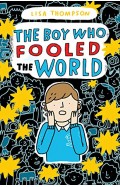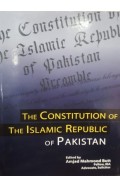- Home
- The Battle for Hearts and Minds: Using Soft Power to Undermine Terrorist Networks (Washington Quarterly Readers) Paperback
The Battle for Hearts and Minds: Using Soft Power to Undermine Terrorist Networks (Washington Quarterly Readers) Paperback
By: Alexander T.J. Lennon
-
Rs 845.75
- Rs 995.00
- 15%
You save Rs 149.25.
Due to constant currency fluctuation, prices are subject to change with or without notice.
Examining the potential of nonmilitary strategies to reduce terrorism, including postconflict reconstruction, public diplomacy, and foreign assistance. Although military operations have dominated media coverage of the war on terrorism, a much broader array of policy options may hold the key to reducing the appeal of global terrorist networks, particularly in economically destitute areas. These strategies involve the use of "soft power," a term first used by political scientist Joseph Nye in a 1990 article in Foreign Policy to describe nonmilitary strategies to shape international relations and behavior. The Battle for Hearts and Minds discusses four aspects of soft power. The first section of the book considers failed or failing states as havens for transnational terrorist networks, and examines the most effective ways to build stable nations in unstable regions, including focused looks at Afghanistan and Sierra Leone. The second section explores postconflict reconstruction, including in-depth examinations of security, justice and reconciliation, opportunities for achieving socioeconomic well-being, and increased participation in government. The third section examines public diplomacy, asking whether the United States needs new policies or simply a new image to increase its appeal in the Arab and Muslim world. The final section of the book looks at foreign assistance, and assesses the potential of the current administration's "Millennium Challenge Account" (or as one contributor puts it, "Compassionate Conservatism Meets Global Poverty") to combat poverty, increase democracy, and reduce the appeal of terror. The Battle for Hearts and Minds presents a balanced assessment of the role that nonmilitary options can play against transnational terrorist networks.
Examining the potential of nonmilitary strategies to reduce terrorism, including postconflict reconstruction, public diplomacy, and foreign assistance. Although military operations have dominated media coverage of the war on terrorism, a much broader array of policy options may hold the key to reducing the appeal of global terrorist networks, particularly in economically destitute areas. These strategies involve the use of "soft power," a term first used by political scientist Joseph Nye in a 1990 article in Foreign Policy to describe nonmilitary strategies to shape international relations and behavior. The Battle for Hearts and Minds discusses four aspects of soft power. The first section of the book considers failed or failing states as havens for transnational terrorist networks, and examines the most effective ways to build stable nations in unstable regions, including focused looks at Afghanistan and Sierra Leone. The second section explores postconflict reconstruction, including in-depth examinations of security, justice and reconciliation, opportunities for achieving socioeconomic well-being, and increased participation in government. The third section examines public diplomacy, asking whether the United States needs new policies or simply a new image to increase its appeal in the Arab and Muslim world. The final section of the book looks at foreign assistance, and assesses the potential of the current administration's "Millennium Challenge Account" (or as one contributor puts it, "Compassionate Conservatism Meets Global Poverty") to combat poverty, increase democracy, and reduce the appeal of terror. The Battle for Hearts and Minds presents a balanced assessment of the role that nonmilitary options can play against transnational terrorist networks.
The Battle for Hearts and Minds: Using Soft Power to Undermine Terrorist Networks (Washington Quarterly Readers) Paperback
By: Alexander T.J. Lennon
Rs 845.75 Rs 995.00 Ex Tax :Rs 845.75
Zubin Mehta: A Musical Journey (An Authorized Biography)
By: VOID - Bakhtiar K. Dadabhoy
Rs 892.50 Rs 1,050.00 Ex Tax :Rs 892.50
American Encounters With Arabs: The Soft Power Of U.s. Public Diplomacy In The Middle East
By: N/A
Rs 535.50 Rs 595.00 Ex Tax :Rs 535.50
The Battle for Hearts and Minds: Using Soft Power to Undermine Terrorist Networks (Washington Quarterly Readers) Paperback
By: Alexander T.J. Lennon
Rs 845.75 Rs 995.00 Ex Tax :Rs 845.75
What's Wrong with the United Nations and How to Fix It - (PB)
By: Thomas G. Weiss
Rs 4,045.50 Rs 4,495.00 Ex Tax :Rs 4,045.50
The Extinction Market : Wildlife Trafficking and How to Counter it
By: Vanda Felbab-Brown
Rs 2,630.75 Rs 3,095.00 Ex Tax :Rs 2,630.75
The Constitution of the Islamic Republic of Pakistan
By: Amjad Mahmood Butt
Rs 1,125.00 Rs 1,250.00 Ex Tax :Rs 1,125.00
American Encounters With Arabs: The Soft Power Of U.s. Public Diplomacy In The Middle East
By: N/A
Rs 535.50 Rs 595.00 Ex Tax :Rs 535.50
No recently viewed books available at the moment.
Zubin Mehta: A Musical Journey (An Authorized Biography)
By: VOID - Bakhtiar K. Dadabhoy
Rs 892.50 Rs 1,050.00 Ex Tax :Rs 892.50
The Battle for Hearts and Minds: Using Soft Power to Undermine Terrorist Networks (Washington Quarterly Readers) Paperback
By: Alexander T.J. Lennon
Rs 845.75 Rs 995.00 Ex Tax :Rs 845.75
American Encounters With Arabs: The Soft Power Of U.s. Public Diplomacy In The Middle East
By: N/A
Rs 535.50 Rs 595.00 Ex Tax :Rs 535.50












-Paperback-313x487.jpg?q6)
-Paperback-120x187.jpg?q6)
-120x187.jpg?q6)








-120x187.jpg?q6)

-120x187.jpg?q6)
-120x187.jpg?q6)

